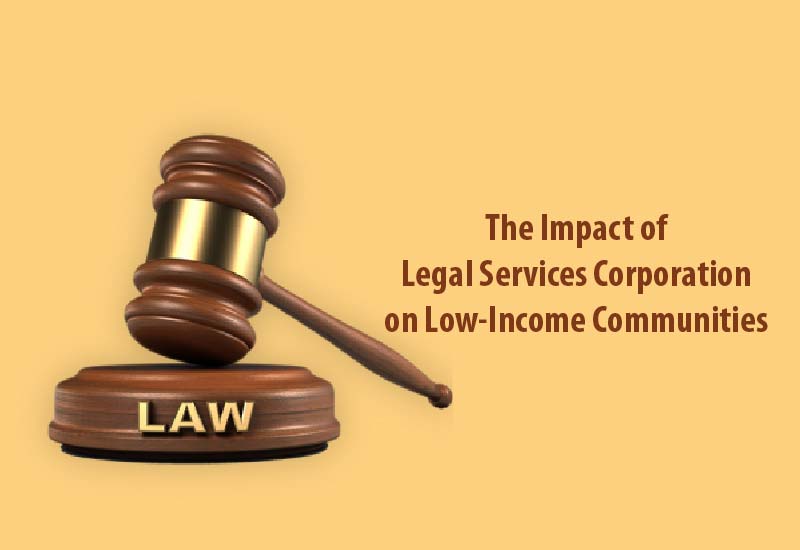The Impact of Legal Services Corporation on Low-Income Communities

Introduction
The Legal Services Corporation (LSC) is a non-profit corporation established by the US Congress in 1974 to provide financial support for legal assistance to low-income Americans. LSC’s mission is to provide equal access to justice and ensure the availability of high-quality legal representation for those who cannot afford it. It provides funding for civil legal services programs in all 50 states, Washington D.C., and the territories of Guam and Puerto Rico, as well as Native American tribal governments. LSC also administers grant programs that fund pro bono activities, technology initiatives, law school clinics, and disaster relief efforts. The organization works with national partners such as law schools, state bar associations, and local courts to ensure its resources are used responsibly and effectively on behalf of those who need them most.
History of Legal Services Corporation
The corporate legal service in Vietnam is a non-profit corporation created in 1974 with the mission of providing high-quality civil legal assistance to low-income individuals across the United States. The organization was established as part of President Nixon’s War on Poverty, and it remains the largest single source of funding for civil legal aid in the country.
The history of LSC reflects a long commitment to advancing justice and providing access to legal services for those who lack the resources to pay for them. The seeds for the program were planted in 1966 when President Johnson signed into law the Economic Opportunity Act, which established a number of community action programs aimed at reducing poverty. One such program was called “Legal Services for Poor People,” and it provided financial support to lawyers who offered free civil legal advice and representation in areas like housing, public benefits, consumer protection, and family law.
In 1970, Congress passed legislation expanding this program by creating a new entity: The National Legal Services Corporation (NLSC). This organization had broader authority than its predecessor; it could provide grants directly to local programs that provided free or low-cost representation as well as fund research initiatives designed to improve access to justice.

Overview of Programs and Services Provided by Legal Services Corporation
The Legal Services Corporation (LSC) is a non-profit corporation that provides legal assistance to low-income Americans. Established by Congress in 1974, the LSC is the largest single funder of civil legal aid in the United States.
The mission of the LSC is to promote equal access to justice and provide high-quality civil legal assistance to those who are unable to afford it. Through its network of independent grantees, the LSC provides a wide range of services including advice and representation on issues such as housing, public benefits, health care, consumer rights, domestic violence protection orders, elder law and more.
The LSC offers programs ranging from direct representation in court cases or administrative hearings; providing self-help materials for pro se litigants; providing training for lawyers and other professionals; encouraging partnerships between local bar associations and community organizations; providing grants for technology initiatives that support access to justice programs; creating national task forces on emerging issues related to poverty law; offering special projects focused on certain underserved populations like veterans or persons with disabilities; as well as funding research into access to justice initiatives.
Criticisms and Challenges Faced by Legal Services Corporation
The Legal Services Corporation (LSC) is a nonprofit corporation created by the United States Congress in 1974 to provide legal assistance to low-income Americans. Since its founding, LSC has been at the centre of numerous debates on how best to allocate limited resources and ensure access to justice for all. Despite its success in providing much-needed legal services, the organization has faced criticism and challenges from both sides of the political aisle.
One major criticism of LSC is that it duplicates existing private sector resources. Opponents argue that there is no need for a separate government entity when private organizations are already providing legal aid to those who cannot afford it. This argument has been echoed by members of Congress who have sought to reduce or eliminate funding for LSC in order to reduce government spending. Additionally, some critics argue that LSC funds are being used inefficiently due to cumbersome bureaucracy and a lack of proper oversight.
Another common criticism is that LSC provides too much “free” legal advice and representation, thereby discouraging people from seeking out private attorneys or utilizing other options available through state bar associations or other organizations dedicated toward providing access-to-justice initiatives such as pro bono opportunities and reduced fee arrangements with attorneys in certain practice areas.

Impact of Legal Services Corporation on the U.S. Justice System
The Legal Services Corporation (LSC) is a United States government-funded nonprofit organization that provides civil legal aid to Americans who cannot otherwise afford it. Established in 1974, the mission of the LSC is to provide equal access to justice for all Americans, regardless of income. The LSC has had a profound impact on the U.S. justice system, particularly in its ability to expand access to legal services among low-income individuals and families.
Through its network of independent local programs, the LSC provides assistance with civil matters such as family law issues and landlord/tenant disputes. It also offers support for consumer protection cases and other matters related to poverty law such as housing assistance and public benefits advocacy. In addition, the LSC helps provide representation in civil cases that involve medical malpractice or injury caused by another person or entity’s negligence or wrongful conduct.
The impact of this work has been profound – research shows that when individuals receive representation from an attorney through an LSC program they are more likely than those without legal assistance to have favourable outcomes in their case, including more successful negotiation settlements and fewer evictions resulting from landlord disputes. T
Conclusion
The Legal Services Corporation is a vital resource for providing access to legal assistance and representation to those who might otherwise not be able to afford it. It has helped countless people in need of legal help, from the elderly and veterans to those facing eviction or foreclosure. Through its support of pro bono lawyers, law students, attorneys in private practice and other organizations working with underserved populations, LSC plays a critical role in ensuring that everyone has access to justice regardless of their income level.






